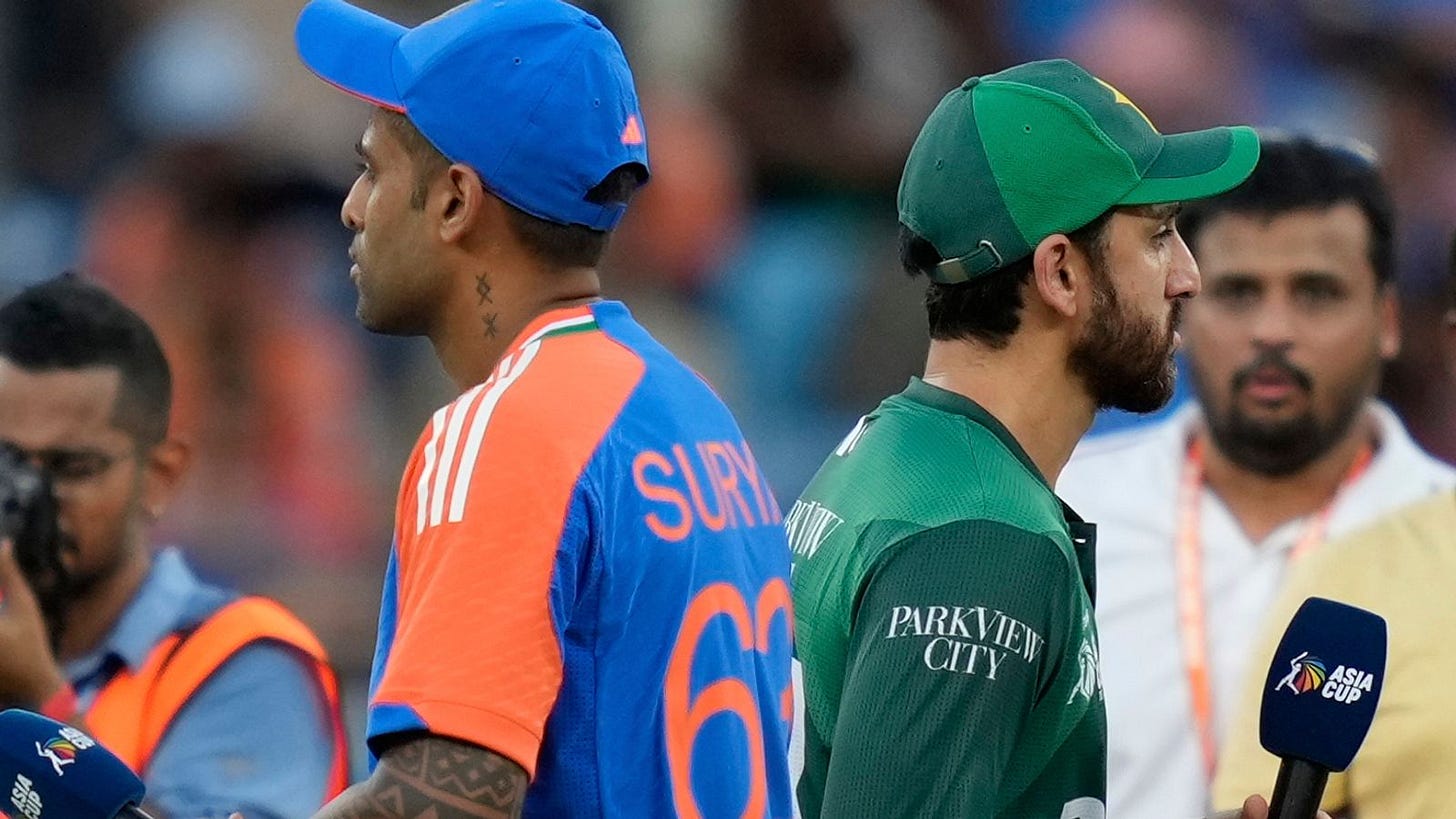India skips handshake after beating Pakistan
here's what happened
Tuesdays are for fresh starts (yes, not Monday), but if you were hoping cricket might offer a clean slate for India and Pakistan this weekend, think again.
What should’ve been a fiery yet respectful Asia Cup clash ended in a thumping Indian victory, and a missing handshake that has everyone talking.
Let’s dive in…
📌 The match that was more than a match
The much-anticipated India vs Pakistan Asia Cup 2025 Group A match in Dubai wasn’t just another cricket rivalry; it was loaded with the baggage of a recent four-day military conflict.
The Indian government’s approval for the match had raised hopes of at least symbolic reconciliation on the pitch.
Instead, India’s captain Suryakumar Yadav made it clear: this game wasn’t about handshakes.
After guiding India to a seven-wicket win with his match-finishing runs, Yadav and his teammates walked straight off the field - no handshakes with Pakistan, no closing rituals, just a curt end to the evening.
📌 Why the refusal?
When pressed, Yadav was blunt:
“A few things in life are above sportsman’s spirit. We dedicate this win to the victims of the Pahalgam attack and to our armed forces.”
He was referring to the April 22 terror attack in Pahalgam that killed 26, an incident India blamed on Pakistani involvement despite a Kashmir-based group claiming responsibility.
India’s subsequent missile strikes inside Pakistan triggered retaliatory attacks, nearly pushing both countries into war before an international ceasefire was brokered.
Against that backdrop, the handshake became more than a gesture—it became a statement.
📌 Awkward scenes in Dubai
Here’s how it unfolded:
After India sealed the win, Pakistan’s players waited on the field, expecting the customary handshake.
Instead, the Indians shook hands among themselves and disappeared into their dressing room.
Pakistan’s captain, Salman Agha, and his team were left standing awkwardly, visibly miffed.
Later reports revealed that match referee Andy Pycroft had permitted India to skip handshakes, both pre-toss and post-match. But crucially, the Pakistani camp wasn’t informed.
📌 Pakistan’s protest
Pakistan’s team manager, Naveed Akram Cheema, lodged an official protest, after which Pycroft reportedly apologized. Agha even boycotted his post-match interview, a silent but sharp response.
Pakistan’s coach, Mike Hesson, voiced the frustration:
“We were ready to shake hands, but our opposition did not. By the time we walked over, they were already in the dressing room.”
📌 Sports vs Politics
Handshakes in cricket aren’t just a nicety - they’re tradition. They symbolize closure, mutual respect, and the idea that cricket can rise above conflict. Which is why the incident has split opinion:
Critics, like ACC chairman Mohsin Naqvi, called it “utterly disappointing” and accused India of dragging politics into sport.
Supporters argue that given the Pahalgam attack and ensuing conflict, India’s stance was a justified show of solidarity.
📌 What’s next?
If both teams progress to the Super Fours, we could see another India-Pakistan clash as early as Sunday in Dubai.
Will the ACC step in to enforce sportsmanship protocols, or will political tensions continue to dictate on-field behavior?
For now, one thing is clear: in South Asia, cricket is never “just a game.”
📌 Takeaway
A seven-wicket win should’ve been the headline.
Instead, it’s the handshake that never happened. The controversy has underlined how fragile the line between sport and politics can be, and how, sometimes, cricket becomes a continuation of diplomacy by other means.
So, that’s it for today. If you enjoyed this edition, subscribe to hear from us every day!
See ya 👋


